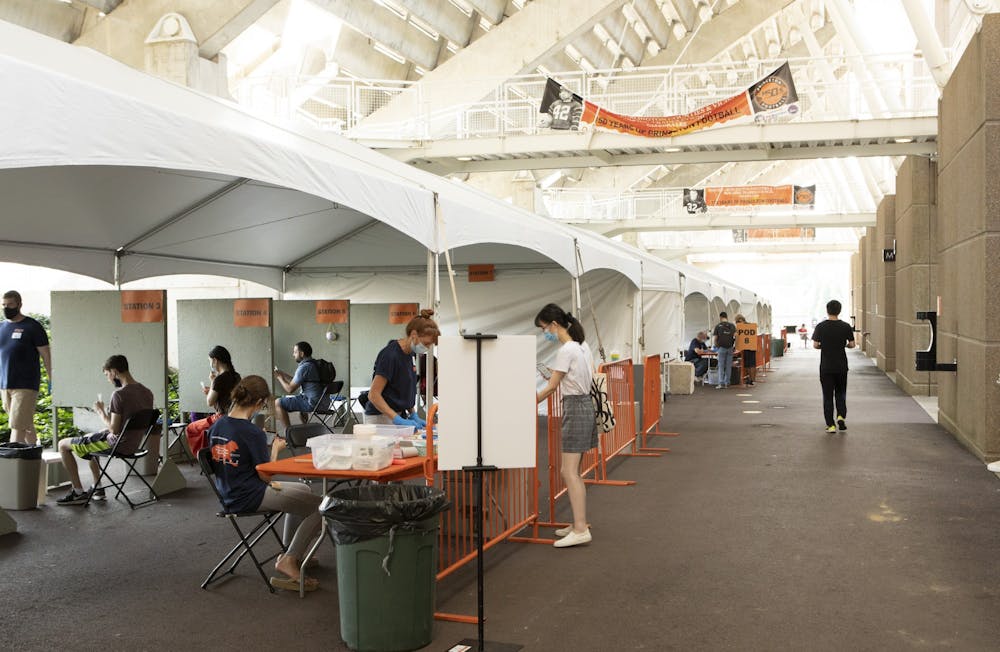The following is a guest contribution and reflects the author’s views alone. For information on how to submit an article to the Opinion Section, click here.
When I received the Dec. 27 email memo from Dean Dolan and Vice President Calhoun, a pit formed in my stomach. My worst fears about my last semester at Princeton were realized. The University announced a slew of new restrictions that would take us closer to the isolating days of last spring, at a time when there was a much poorer understanding of COVID, vaccines were sparse, and there were no FDA approved orally administered antiviral drugs, with a more deadly variant going around.
Student gatherings are once again severely limited — at 20 people — and we are banned from traveling outside of the Princeton area. As we enter the third year of the pandemic, it is increasingly clear that our planned approach to living with the virus this next semester is unhealthy and unsustainable. These restrictions are being put in place despite the fact that essentially every member of the University community will be both vaccinated and boosted against COVID-19 by the end of January.
The University has an unrealistic obsession with the number of COVID-19 cases on campus. We cannot fall into that trap again.
It’s become increasingly clear to epidemiologists and the general public that COVID-19 is here to stay. The omicron variant seems to have a much lower incidence of serious illness, especially for vaccinated individuals. This observation is backed by public health data and statements by public health officials like Dr. Anthony Fauci. These experts, politicians, and community leaders are finally beginning to acknowledge that it’s time to start approaching the virus differently than we did a year ago, especially given the widespread availability of vaccines and treatments.
The most obvious shift is to stop treating case numbers as the most important number. Sarah Zhang argued in an illuminating recent piece in The Atlantic that it is clear to experts that case numbers are “becoming less and less useful.” The University’s obsession with case numbers as the guiding metric for life on campus needs to change.
The first step towards this approach is to end asymptomatic testing. Brown University became the first Ivy League school to do this, in November, with an administrator stating that “[w]e wanted to make this change as soon as we could, but waited until we had data supporting that it would be prudent to do so.” Our own administrators could learn something from Brown. Multiple weeks of zero positive COVID-19 tests among undergraduates last fall saw no changes in masking or other mitigation rules. Who knows what sort of pretzel logic the school will twist this spring?
It’s also become increasingly clear to parents, researchers, and school administrators that various restrictions on academic and social life are far worse for young people than the physical effects of the virus itself. At Princeton, Counseling and Psychological Services (CPS) visits are up this academic year. CPS Director Dr. Calvin Chin attributed this to “homesickness,” as if the unique part of this semester is that students are away from home. We have to lay the blame at what is unique to this semester — the stringent COVID-related restrictions.

Dolan and Calhoun claim that yet another round of social and travel restrictions are necessary to support the “residential, in-person Princeton teaching, learning, and co-curricular experience we all cherish.” But how can we cherish and enjoy what Princeton has to offer if we can’t live the lives we were promised as college students? The administration seems to prefer that we live on campus as antisocial robots, going to class masked day in and day out, not even able to read facial expressions or hear what our classmates are mumbling about through the fabric on their faces.
The new policies are also unfairly applied. Student travel and gatherings are restricted for at least the first few weeks of the semester. But our professors and other University staff are free to head to New York for day trips, attend dinner parties with friends, or fly to Colorado for a ski weekend with the family. The student body seemed to accept the various arbitrary restrictions in the fall despite near-universal vaccination because we were deprived of anything close to college life for over a year by University administrators (while, I should note, thousands of other colleges and universities with fewer resources were able to open their doors and offer a close-to-normal experience).
Most of the country was back to work and life within a few months of COVID-19 bringing America to her knees in early 2020. The work-from-home class that comprises the bureaucratic backbone of the University seems to still be unable to grasp this fact or ascertain any pragmatic assessment of COVID-19 risk. We are stuck in a mind-numbing cycle of restrictions any time there are a few dozen of mostly asymptomatic COVID-19 cases on campus and will likely remain so for a long time, unless the administrators seriously reorient their approach to the virus and our wellbeing.
Their excuses grow less convincing every day. For example, one concern for some University faculty and staff in the fall was risk to unvaccinated children. Now, kids, who were already at a very low risk of developing any serious COVID-19 symptoms, are eligible to be vaccinated. In addition, more and more students, faculty, and staff have already contracted the virus and consequently have higher levels of immunity.

This spring could be a unique opportunity for Princeton to lead the charge back towards pre-pandemic life. But I don’t have my hopes up.
Tom Salotti is a senior from Arlington, Virginia and Head Sports Editor Emeritus. He can be reached at tsalotti@princeton.edu








